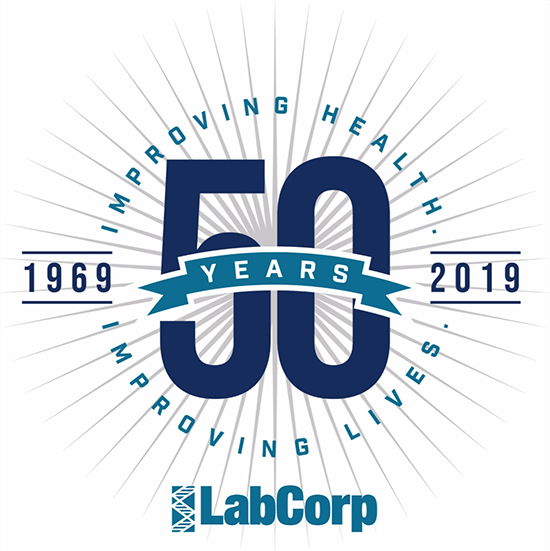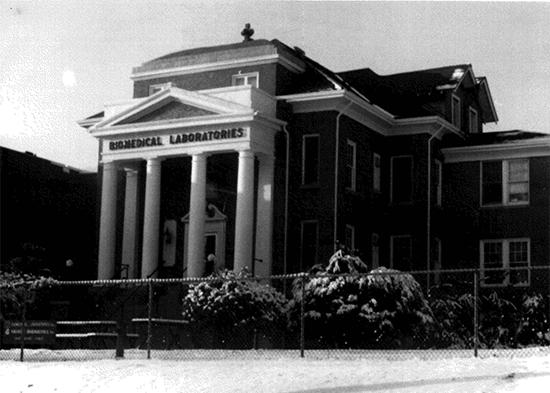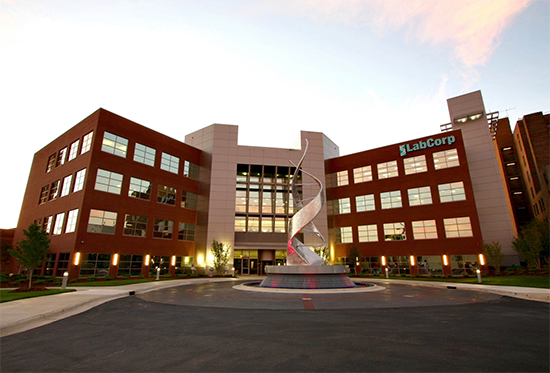
LabCorp at 50: Remembering the Past, Looking to the Future

When James Powell was a young medical student at Duke University more than a half century ago, the standard procedure was to send patients’ specimen samples from Durham all the way to California for testing. It took a two-week round-trip to glean the results for a simple thyroid analysis.
Powell and his brothers, Thomas and John, envisioned a better way: create an East Coast-based lab that could provide high-quality testing services and rapid turnaround at a reasonable rate. Several years later, after James Powell completed medical residency and a stint in the military – and technology improved – the three siblings did just that
In 1969 they launched the small Burlington-based medical testing business Biomedical Laboratories, which subsequently became LabCorp. The company is celebrating its 50th anniversary in October 2019.
Getting the company off the ground

-- LabCorp photos
The Powell brothers bankrolled the endeavor with their own money and loans from local banks and from their father, Thomas Edward Powell. He was a former Elon College (now Elon University) biology professor who had founded another successful Burlington-based business, Carolina Biological Supply. Biomedical Laboratories’ first offices were housed in the former Alamance General Hospital building that he'd purchased.
James Powell led the young company and his two brothers remained involved as investors. “We sort of had the training we needed in the family to get the business started,” Powell said in an interview with the North Carolina Biotechnology Center.
His specialty was pathology. His brother Ed – also a doctor – was a cellular biologist. And John was a lawyer with an MBA. The company began with fewer than a dozen employees, and initially handling lab samples for physicians and hospitals in central North Carolina.
What a difference a few decades can make. Today LabCorp is an international life science powerhouse that has grown out of the Powells’ initiative and numerous strategic acquisitions along the way. The company, still headquartered in Burlington, is now an $11 billion-plus S&P 500 business with nearly 61,000 employees.
Rapid growth by acquisition

in the former Alamance General Hospital.
The plan all along, according to James Powell, was to grow from within by expanding service areas, and from without though acquisitions. That growth kicked into high gear three years after Biomedical Reference Laboratories (Reference had been added to the company’s name) went public in 1979 – and just 10 years after its founding – when it was acquired by Hoffman-La Roche for $163.5 million. James Powell remained CEO, a role he filled for the first 27 years of the company’s existence.
The corporation’s name later changed to Roche Biomedical. And, following a merger with National Health Laboratories in 1995, the combined entity became Laboratory Corporation of America Holdings – LabCorp for short.
Today LabCorp operates in more than 100 countries. In addition to its bread-and-butter diagnostic services business, the company is involved in drug development through Covance, a leading global contract research organization it acquired in 2015.
LabCorp now processes more than 2.5 million patient specimens a week – a far cry from the 100 a day Powell said his father initially recommended for Biomedical Labs. And the company has been involved in the development of all the current top 50 drugs on the market, measured by 2018 sales revenue.
Taking pride in the company’s people and accomplishments

“In 50 years, LabCorp has transformed from a laboratory in a former hospital to a leading global life sciences company,” said David P. King, the company’s chairman and CEO since 2007. “That’s because of the collective passion and commitment of the tens of thousands of people who have contributed to our success. I look at all the fantastic people who work here and I think that’s something to be proud of.”
King said he’s likewise proud of the company’s growth during his tenure, from a regional player into a national leader in diagnostics. And he highlights LabCorp’s metamorphosis from a laboratory company to a life sciences leader with the acquisition of Covance.
Under King’s leadership, LabCorp also entered the Fortune 500, was named to Fortune’s list of the World’s Most Admired Companies and Forbes’ ranking of the World’s Most Innovative Companies, and earned the designation as a Best Place to Work for LGBTQ Equality by the Human Rights Campaign Foundation.
LabCorp is an economic mainstay in North Carolina, where it employs more than 8,200 people and occupies 2.5 million square feet of office and lab space. That real estate is used to process more than 100 million laboratory tests each year.

The company is widely recognized for the supportive role it plays in Burlington and surrounding communities. It has, for example, partnered with Elon University on a number of initiatives, including scholarship programs and the Elon Academy for financially disadvantaged high school students. Early this year, LabCorp donated $1 million to Alamance Community College to support the school’s growing biotechnology and life science curricula. And it also has been involved in downtown restoration efforts in Burlington.
The Alamance Community College gift from LabCorp gift followed close on the heels of a $100,000 Economic Development Award from the North Carolina Biotechnology Center. The funding, announced late last year, will help boost bioscience industry growth in Burlington and Alamance County. It is tied to LabCorp’s commitment to create and maintain at least 20 new life-science-related jobs in the county over the next four years.
“LabCorp is a tremendous life science success story and a major contributor to this state’s economic growth and stability,” said Nancy Johnson, executive director of NCBiotech's Piedmont Triad Region. “Equally important are the company’s efforts to support the quality of life in Burlington, Alamance County and beyond.”
Looking to the future
What lies ahead for LabCorp? “The business will look a lot the same in terms of its competencies,” King said. “But you’ll see a continuous expansion of the things we do today. I think we’ll be bigger, more global, and our two businesses will be better integrated to collaborate on things like treatments for cancer, cardiovascular and infectious disease.”

He’ll leave that task to Adam H. Schechter, a former Merck executive who will take over as CEO at the end of October when King retires. “I’m the rare CEO who can feel 150% great about my successor,” King noted. “One of the most important things a leader can do is choose an outstanding successor and I feel great that we’ve done that here. The company is in terrific hands.”
Both King and Powell – two of only three CEOs in the company’s five-decade history – agree that employees are one of the most important factors in the company’s tremendous success to date. “The thousands of people who have contributed to our success have probably been the best thing that has happened to us,” Powell observed. “It’s a people business and I’m just proud of the ability of our employees to work together, be flexible, and to do things in a way that hadn’t been done before.”
Many current employees were on hand on October 15 at the company’s 50th anniversary celebration in Burlington. It was a dual milestone for Janice Ray. She was the third employee James Powell hired in 1969. And she continues to work as a supervisor for LabCorp today.
